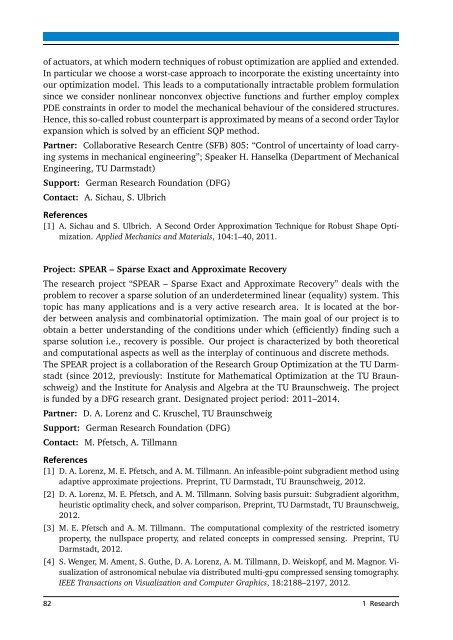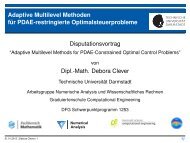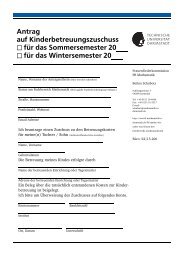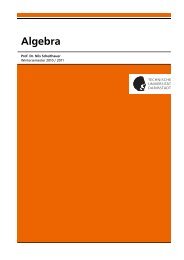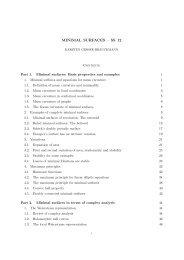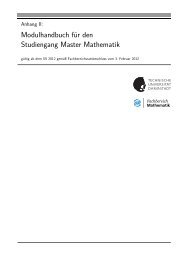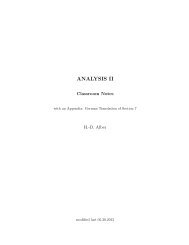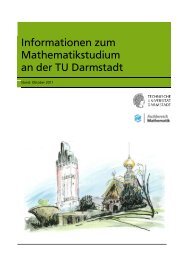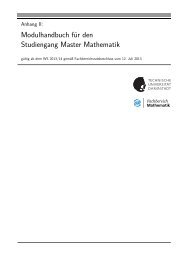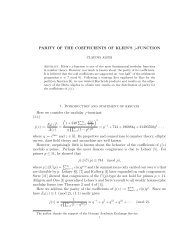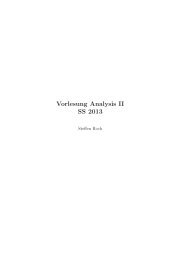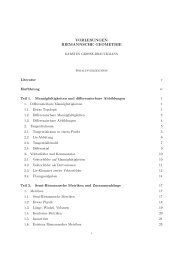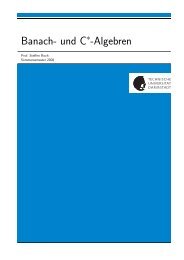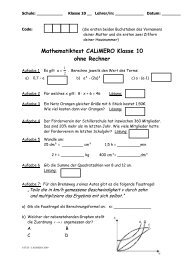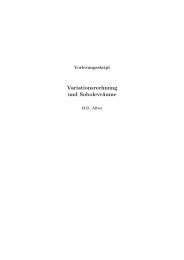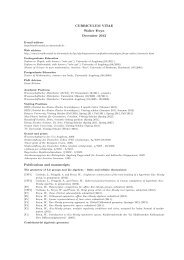Biannual Report - Fachbereich Mathematik - Technische Universität ...
Biannual Report - Fachbereich Mathematik - Technische Universität ...
Biannual Report - Fachbereich Mathematik - Technische Universität ...
You also want an ePaper? Increase the reach of your titles
YUMPU automatically turns print PDFs into web optimized ePapers that Google loves.
of actuators, at which modern techniques of robust optimization are applied and extended.<br />
In particular we choose a worst-case approach to incorporate the existing uncertainty into<br />
our optimization model. This leads to a computationally intractable problem formulation<br />
since we consider nonlinear nonconvex objective functions and further employ complex<br />
PDE constraints in order to model the mechanical behaviour of the considered structures.<br />
Hence, this so-called robust counterpart is approximated by means of a second order Taylor<br />
expansion which is solved by an efficient SQP method.<br />
Partner: Collaborative Research Centre (SFB) 805: “Control of uncertainty of load carrying<br />
systems in mechanical engineering”; Speaker H. Hanselka (Department of Mechanical<br />
Engineering, TU Darmstadt)<br />
Support: German Research Foundation (DFG)<br />
Contact: A. Sichau, S. Ulbrich<br />
References<br />
[1] A. Sichau and S. Ulbrich. A Second Order Approximation Technique for Robust Shape Optimization.<br />
Applied Mechanics and Materials, 104:1–40, 2011.<br />
Project: SPEAR – Sparse Exact and Approximate Recovery<br />
The research project “SPEAR – Sparse Exact and Approximate Recovery” deals with the<br />
problem to recover a sparse solution of an underdetermined linear (equality) system. This<br />
topic has many applications and is a very active research area. It is located at the border<br />
between analysis and combinatorial optimization. The main goal of our project is to<br />
obtain a better understanding of the conditions under which (efficiently) finding such a<br />
sparse solution i.e., recovery is possible. Our project is characterized by both theoretical<br />
and computational aspects as well as the interplay of continuous and discrete methods.<br />
The SPEAR project is a collaboration of the Research Group Optimization at the TU Darmstadt<br />
(since 2012, previously: Institute for Mathematical Optimization at the TU Braunschweig)<br />
and the Institute for Analysis and Algebra at the TU Braunschweig. The project<br />
is funded by a DFG research grant. Designated project period: 2011–2014.<br />
Partner: D. A. Lorenz and C. Kruschel, TU Braunschweig<br />
Support: German Research Foundation (DFG)<br />
Contact: M. Pfetsch, A. Tillmann<br />
References<br />
[1] D. A. Lorenz, M. E. Pfetsch, and A. M. Tillmann. An infeasible-point subgradient method using<br />
adaptive approximate projections. Preprint, TU Darmstadt, TU Braunschweig, 2012.<br />
[2] D. A. Lorenz, M. E. Pfetsch, and A. M. Tillmann. Solving basis pursuit: Subgradient algorithm,<br />
heuristic optimality check, and solver comparison. Preprint, TU Darmstadt, TU Braunschweig,<br />
2012.<br />
[3] M. E. Pfetsch and A. M. Tillmann. The computational complexity of the restricted isometry<br />
property, the nullspace property, and related concepts in compressed sensing. Preprint, TU<br />
Darmstadt, 2012.<br />
[4] S. Wenger, M. Ament, S. Guthe, D. A. Lorenz, A. M. Tillmann, D. Weiskopf, and M. Magnor. Visualization<br />
of astronomical nebulae via distributed multi-gpu compressed sensing tomography.<br />
IEEE Transactions on Visualization and Computer Graphics, 18:2188–2197, 2012.<br />
82 1 Research


